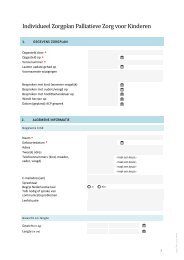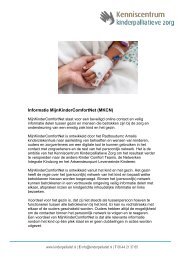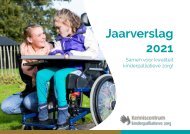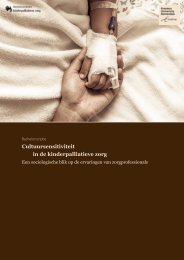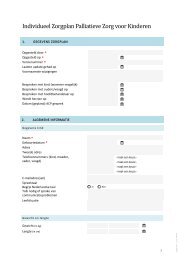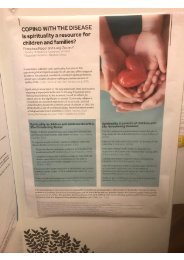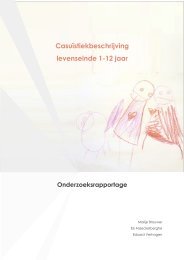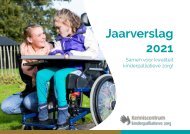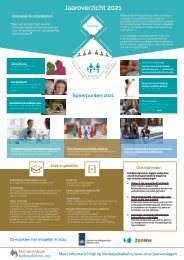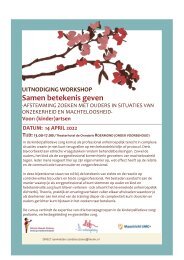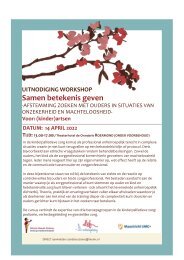EAPC Atlas of Palliative Care in Europe 2019
Conclusion: PC health policies developed in recent years have promoted vigorous development across Europe. Preliminary data on the integration of PC into different fields are encouraging though inequalities between countries and sub-regions persist. Further comparative analysis exploring factors leading to uneven progress may inform strategies to provide PC for all people in need. Per land is de stand van zaken van de (kinder)palliatieve zorg weergegeven.
Conclusion: PC health policies developed in recent years have promoted vigorous development across Europe. Preliminary data on the integration of PC into different fields are encouraging though inequalities between countries and sub-regions persist. Further comparative analysis exploring factors leading to uneven progress may inform strategies to provide PC for all people in need.
Per land is de stand van zaken van de (kinder)palliatieve zorg weergegeven.
Create successful ePaper yourself
Turn your PDF publications into a flip-book with our unique Google optimized e-Paper software.
The <strong>in</strong>stitutions <strong>in</strong>volved<br />
PRESENTATION<br />
B<br />
About the <strong>Europe</strong>an Association<br />
for <strong>Palliative</strong> <strong>Care</strong><br />
The <strong>Europe</strong>an Association for <strong>Palliative</strong> <strong>Care</strong> (<strong>EAPC</strong>), established<br />
<strong>in</strong> 1988, is a membership organisation that aims to advance,<br />
<strong>in</strong>fluence, promote and develop palliative care <strong>in</strong> <strong>Europe</strong>. S<strong>in</strong>ce<br />
its <strong>in</strong>ception, the <strong>EAPC</strong> has evolved <strong>in</strong>to the lead<strong>in</strong>g palliative care<br />
organisation <strong>in</strong> <strong>Europe</strong> provid<strong>in</strong>g a forum for all <strong>of</strong> those either<br />
work<strong>in</strong>g, or with an <strong>in</strong>terest <strong>in</strong>, palliative care throughout <strong>Europe</strong><br />
and beyond. Currently the <strong>EAPC</strong> has 55 members associations<br />
from 34 <strong>Europe</strong>an countries and also has <strong>in</strong>dividual members<br />
from 52 countries globally. Members are engaged <strong>in</strong> palliative<br />
care from a range <strong>of</strong> perspectives; specialist cl<strong>in</strong>ical practice,<br />
education, policy and research. The <strong>EAPC</strong> is respectful <strong>of</strong> the cultural<br />
and political diversities <strong>of</strong> our members across <strong>Europe</strong> but<br />
aims to ensure that as a collective group, that we speak with ‘one<br />
voice-one vision’ on matters important for the practice and development<br />
<strong>of</strong> palliative care.<br />
Further <strong>in</strong>formation on the <strong>Europe</strong>an Association for <strong>Palliative</strong><br />
<strong>Care</strong> is available at: https://www.eapcnet.eu<br />
S<strong>in</strong>ce its <strong>in</strong>ception, the <strong>EAPC</strong> has evolved <strong>in</strong>to the lead<strong>in</strong>g<br />
palliative care organisation <strong>in</strong> <strong>Europe</strong> provid<strong>in</strong>g a forum for all<br />
<strong>of</strong> those either work<strong>in</strong>g, or with an <strong>in</strong>terest <strong>in</strong>, palliative care<br />
throughout <strong>Europe</strong> and beyond.<br />
About the ATLANTES Research Programme,<br />
Institute for Culture and Society,<br />
and the University <strong>of</strong> Navarra (UNAV)<br />
The ATLANTES Research Program is be<strong>in</strong>g developed under the<br />
assumption that it is possible to promote a positive attitude <strong>in</strong><br />
the society and <strong>in</strong> medic<strong>in</strong>e regard<strong>in</strong>g the attention and care <strong>of</strong><br />
patients with advanced and term<strong>in</strong>al illness, from a perspective<br />
based on human dignity and pr<strong>of</strong>essional care, <strong>in</strong>clud<strong>in</strong>g support<br />
and respect for the natural course <strong>of</strong> the illness and the attention<br />
to the spiritual and emotional aspects <strong>of</strong> patient care.<br />
The multi-discipl<strong>in</strong>ary team, based <strong>in</strong> Pamplona, with<strong>in</strong> the Institute<br />
for Culture and Society at the University <strong>of</strong> Navarra, <strong>in</strong>cludes<br />
pr<strong>of</strong>essionals from diverse social sciences. In addition, the team<br />
also relies on a wide net <strong>of</strong> collaborators from different countries<br />
who provide a broader <strong>in</strong>ternational perspective.<br />
ATLANTES works work on four strategic l<strong>in</strong>es: The <strong>in</strong>tangible<br />
aspects <strong>of</strong> palliative care, the message <strong>of</strong> palliative care to the<br />
community, pr<strong>of</strong>essional and public education, and the <strong>in</strong>ternational<br />
development <strong>of</strong> the palliative care. ATLANTES has conducted<br />
mapp<strong>in</strong>g studies <strong>in</strong> Lat<strong>in</strong> America, <strong>Europe</strong>, Africa and the Eastern<br />
Mediterranean region. The present study evaluates palliative<br />
care development with<strong>in</strong> <strong>Europe</strong>, us<strong>in</strong>g a set <strong>of</strong> national-level <strong>in</strong>dicators<br />
selected through an <strong>in</strong>ternational consensus process and<br />
specific developed <strong>in</strong>dicators to assess palliative care <strong>in</strong>tegration<br />
<strong>in</strong>to the countries’ health systems.<br />
Further <strong>in</strong>formation on the ATLANTES programme is available at:<br />
http://www.unav.edu/web/<strong>in</strong>stituto-cultura-y-sociedad/proyecto-atlantes<br />
ATLANTES strives to improve the understand<strong>in</strong>g <strong>of</strong> patients<br />
with non-curable illnesses, both <strong>in</strong> the medical field and <strong>in</strong><br />
society, from a dignity-based perspective, <strong>in</strong>clud<strong>in</strong>g accompaniment<br />
and respect for the natural course <strong>of</strong> disease and its<br />
emotional and spiritual dimensions.<br />
About the International Association for Hospice<br />
and <strong>Palliative</strong> <strong>Care</strong> (IAHPC)<br />
The International Association for Hospice and <strong>Palliative</strong> <strong>Care</strong> (IAH-<br />
PC) works with UN agencies, governments, associations, and <strong>in</strong>dividuals<br />
to <strong>in</strong>crease access to essential medic<strong>in</strong>es for palliative<br />
care, foster opportunities <strong>in</strong> palliative care education, research<br />
and tra<strong>in</strong><strong>in</strong>g, and <strong>in</strong>crease service provision around the globe. IAH-<br />
PC works at the <strong>in</strong>ternational, regional, and national levels to promote<br />
appropriate policies and regulations to ensure access to palliative<br />
care. The Vision <strong>of</strong> IAHPC is for universal access to palliative<br />
care, <strong>in</strong>tegrated <strong>in</strong> a cont<strong>in</strong>uum <strong>of</strong> care with disease prevention<br />
and treatment. The Mission <strong>of</strong> IAHPC is to improve the quality <strong>of</strong> life<br />
<strong>of</strong> adults and children with life-threaten<strong>in</strong>g conditions and their<br />
families. IAHPC works with governments, agencies and <strong>in</strong>dividuals,<br />
to improve knowledge and foster opportunities <strong>in</strong> education,<br />
research and tra<strong>in</strong><strong>in</strong>g around the globe.<br />
Further <strong>in</strong>formation on the IAHPC at: http://hospicecare.com/<br />
home/<br />
The Mission <strong>of</strong> IAHPC is to improve the quality <strong>of</strong> life <strong>of</strong> adults<br />
and children with life-threaten<strong>in</strong>g conditions and their<br />
families. IAHPC works with governments, agencies and<br />
<strong>in</strong>dividuals, to improve knowledge and foster opportunities <strong>in</strong><br />
education, research, and tra<strong>in</strong><strong>in</strong>g around the globe.<br />
<strong>EAPC</strong> <strong>Atlas</strong> <strong>of</strong> <strong>Palliative</strong> <strong>Care</strong> <strong>in</strong> <strong>Europe</strong><br />
21




